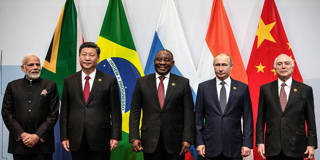New Rules for the New Global Economy
With Donald Trump’s presidency hastening the decline of the US-led international order, questions of global governance have become increasingly urgent. Many of the economic-policy decisions that the United States, China, and other emerging players make today will be felt for decades to come.
Editors’ note: Listen to the conversation with PS Editors’ Podcast. Tune in to all episodes from your favorite podcast app, and subscribe via Apple Podcasts, SoundCloud, or RSS Feed.
Project Syndicate: With the BRICS holding their tenth annual summit, this seems to be the right moment to explore just how much the world economy and its governance structures have evolved since you first coined the term. For example, you have long argued that if global economic governance is to be effective, its main institutional structures need to represent economic reality better than they do now. And that means acknowledging the fact that new economic powers have risen since the post-1945 creation of the Bretton Woods institutions. How, specifically, should global governance change?
Jim O’Neill: The recent G7 meeting in Canada demonstrated that we are living under a pretty outmoded form of global governance. The G7, after all, represents the democracies that had the largest and most important economies in the 1970s, when the group was formed. But since the turn of the millennium, and arguably since the mid-1990s Asian financial crisis, most of those countries have not dominated the world economy.
If we want truly representative governance, we need a system that can change and evolve through time, not unlike the system of promotion and relegation in sports leagues. Otherwise, we run the risk of setting up some entity that becomes irrelevant in 20 years.
